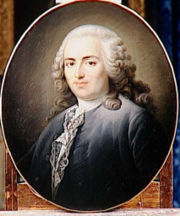安·罗伯特·雅克·杜尔哥
出自 MBA智库百科(https://wiki.mbalib.com/)
目录 |
安·罗伯特·雅克·杜尔哥(Anne Robert Jacques Turgot,1721~1781)法国经济学家,18世纪后半叶法国资产阶级古典经济学家。重农学派最重要的代表人物之一。出身于巴黎一个贵族家庭。
1743~1747年先后在路易学院、圣叙尔皮斯神学院、索邦神学院学习。
1747年获神学学士学位
1748 年转入巴黎索邦神学院,翌年被推选为名誉副院长。曾任索邦神学院院士、名誉副院长。
1751年放弃神职从政。
1752~1761年间在巴黎历任公职。在此期间,他曾于 1753~1756年陪同商务监督 J.C.M.V.de古尔奈(1712~1759)到法国外省视察。
1765~1766年间,他和A.斯密在巴黎相识。
1757年,他也曾是F.魁奈的座上客,见到了魁奈和他的若干徒党,但他没有参加他们的派系活动。
1761~1774年,他任利摩日地方行政长官,在管治区进行若干整理赋税、废除徭役的改革。
1774年,法国国王路易十六即位后,他一度出任海军大臣;不久,调任财政大臣。在任期内,他试图进行多方面的财政改革,其措施集中于1776年初所拟定的六个法令中。其中之一是在全国取消徭役制度;之二是废除行会;其余四个则是试图取消若干苛捐杂税。这就是马克思所说的“杜尔哥试图预先采取法国革命的措施”。这些法令国王同意了,枢密院通过了,但议会不予备案。国王迫使议会服从。但这些侵犯特权阶级权益的措施引起了宫廷和贵族的强烈反对。次年5月杜尔哥终于被免职,法令也随之被取消。
杜尔哥是继魁奈之后的重农学派最重要的代表人物。他深受魁奈的影响但不是魁奈的门徒,也几乎没有参加所谓“经济学家”们的派系活动。他的《关于财富的形成和分配的考察》是重农主义的重要文献。他发展、修正了魁奈和其徒党的论点,使重农主义作为资产阶级思想体系的特征有更加鲜明的表现。在他那里重农主义发展到最高峰。
杜尔哥与重农学派成员有一定联系,但并未参加其派系活动。他在任职时期推行重农主义政策,因受贵族反对而被取消。他给两个将回国的中国留学生写的询问问题的分析性引言形成《关于财富的形成和分配的考察》一文,把重农主义发展到最高峰 。他在魁奈所划分的三个阶级( 生产阶级、不生产阶级、地主阶级)基础上,又进一步划分出资本家和工人,并初步表述了劳动者和劳动条件分离的历史过程。他把纯产品看作是自然界对劳动者的劳动的赐予,实际上认识到地主阶级占有纯产品是对他人劳动的占有。他还明确提出资本的概念。他基本上抛弃了重农学派的封建主义外观,并提出了一系列的政策纲领。马克思称他是“给法国革命引路的激进资产阶级大臣”,“试图采取法国革命的措施”。著有《关于财富的形成和分配的考察》、《集市与市场》、《基金》等。
古尔奈对杜尔哥的经济思想的发展有一定的影响,但更重要的影响来自魁奈。虽然杜尔哥没有参加魁奈这一派的活动,但举凡创自魁奈的重农学派的基本理论,如自然秩序、自由放任、纯产品、农业优先地位、社会经济划分、单一地租税等,杜尔哥几乎无不接受。
但杜尔哥对于重农学派的基本理论不是“述而不作”,而是有所发展。他的体系更少封建主义外观,“纯产品”作为自然赐予,不知不觉地成为土地所有者取自土地耕种者的无偿的剩余劳动。在魁奈的社会阶级划分的基础上,他进一步在生产阶级和不生产阶级内部又各自再划分为资本家和工人。资本家靠资本,使别人从事劳动,通过垫支而赚取利润,而工人则除了能把自己的劳动卖给别人外,就一无所有。他对资本的类别和作用作了进一步的分析,从而论证了利息、利润的合理性和其在作为资本收入本质上的共同性。在杜尔哥那里,重农体系发展到最高峰。
杜尔哥的主要经济著作是 1766 年写的《关于财富的形成和分配的考察》。当时,有两个即将回国的中国留学生受托于回国后将中国情况向在法国的师友作报告。杜尔哥草拟了一系列的问题以便他们在报告中作答。为了使他们了解问题的意义和要求,他在问题的前面写了这一篇分析性的引言。1769年,在P.S.杜邦·德·奈穆尔(1739~1817)的劝说下,杜尔哥将本文投稿于《公民日志》,分期登载于1769年10号、12号和1770年4号,在1770年2、4两月发行。
杜尔哥生前发表的文章还有1756年刊载在《百科全书》上的《集市与市场》和《基金》等。1753年,他还将英国人J.塔克(1712~1799)的《有关商业的重要问题》译成法文,并于1755年出版。
但是,在利摩日长官任内,他给上级写了大量的关于经济问题的备忘录和给民众的公开信;在部长任内,在所颁发的法令前面,他每冠以说明有关原理的前言。这都是有关他的经济思想的重要文献。这些文献和1759年写的《古尔奈的颂赞》,都被汇集为《杜尔哥全集》,于1809~1811年发表。
Originally A. R. J. Turgot planned to enter the Church but experienced doubts concerning his religious calling and turned to a public career. After holding a number of legal positions he purchased, as was the practice, the office of master of requests, a post that often led to appointment as intendant, the chief administrator of a district. However, Turgot's interests extended beyond the law and administration. He was a friend of the philosophes and frequented the intellectual salons of Paris; in 1760 he visited Voltaire, then in exile. He also contributed articles to the Encyclopédie, wrote an essay on toleration, and planned an ambitious history of the progress of man which he never completed.
Turgot was, however, particularly interested in economics and knew Adam Smith, the great English economist, and François Quesnay, founder of the Physiocratic school. He shared their distrust of government intervention in the economy and their belief in free trade but disagreed with the Physiocratic view that only agriculture was productive, while commerce and industry were unproductive.
In 1761 the King named Turgot intendant of the généralité (district) of Limoges, a poor and backward region. During the 13 years that he spent at Limoges, Turgot attempted, despite local opposition and halfhearted support from the central government, a widespread reform of his district. Historians disagree on how successful he was. He brought tax lists up to date and sought to introduce a more equitable method of collecting taxes. He abolished the corvée (forced labor on the roads by peasants) and substituted for it a tax. Consistent with his belief in free trade, he resisted pressure to repeal legislation permitting the free circulation of grain within France during a period of shortages and suppressed riots against the movement of grain. At the same time he opened workshops to provide work for the unemployed which he financed in part by funds that he forced landowners to contribute. He encouraged improvement of agriculture by such means as an agricultural society. While at Limoges, Turgot also continued to study economics and in 1766 published his most important theoretical work on the subject, Reflections on the Formation and Distribution of Wealth, a book whose ideas anticipated Adam Smith's classic study in 1776.
In July 1774 Turgot was named secretary of the navy and the following month controller general of finances (actually prime minister). Although he saw the need for fundamental reforms of the government and society, Turgot also recognized that he must advance cautiously; basic reforms would not only be costly but certain to arouse the opposition of the privileged classes. His first efforts, therefore, emphasized modest reforms and reducing government expenditures by such measures as eliminating useless positions and aid for courtiers. However, even such minor reforms aroused the opposition of the privileged and of financiers whose interests had also been adversely affected. Churchmen, moreover, were suspicious of this friend of the philosophes who "did not attend Mass" and was suspected of favoring tolerance for Protestants.
In January 1776 Turgot presented to the King his famous Six Edicts, which went beyond his previous minor reforms and economies. The two most contested edicts were one ending the monopoly of the guilds and another abolishing the corvée Turgot implied that a tax would be levied upon the "landowners for whom public roads are useful." The Six Edicts now became the target of all the opponents of Turgot; the clergy, the nobles, the queen, Marie Antoinette, all clamored and conspired for his dismissal. They even forged a correspondence in which Turgot made offensive remarks about Louis XVI. The latter, who had at first supported his minister, of whom he had said, "Only Monsieur Turgot and I really love the people, " was unable to resist the pressures upon him and in May 1776 requested Turgot's resignation. The dismissal of Turgot marked the failure of the last attempt to reform the monarchy from within. Turgot, who warned Louis XVI that Charles I of England had lost his head because of his weakness, spent his last years engaged in scholarly and literary work but still sought to influence the King.








